WONDERCABINET : Lawrence Weschler’s Fortnightly Compendium of the Miscellaneous Diverse
WELCOME
Continuing on from last week, more on Buster Keaton, this time in relation to Ludwig Wittgenstein. Followed by a South African vantage on Gaza and a few other such recommended readings. And concluding with a disconcertingly apt Munch-Escherian doodle.
* * *
The Main Event
WITTGENSTEIN AND BUSTER KEATON
Our quick bracing dip into the artistry of Buster Keaton last week suddenly put me in mind of a great piece of writing I encountered over fifty years ago in my college days at UC Santa Cruz, a manuscript on Keaton and Ludwig Wittgenstein, of all people, by Robert Goff, one of my favorite professors there at Cowell College. I was going to write him to see if he still had a copy but it turned out that I myself still had one in my files, so all I had to do was ask Goff for his permission to sample the piece here in the Cabinet, permission he graciously extended.
(The entire typescript is available here on our Google Drive. A more polished version was included in Jonathan Miller’s Laughing Matters: A Serious Look at Humor, though as is often the case in these matters, I prefer the version in the typescript form I originally encountered it.) The text as a whole isn’t so much an argument for Keaton’s philosophical profundity as it is (far more originally) one for Wittgenstein’s comic genius.
Indeed, in the good professor’s telling, as you will eventually see below, Goff demonstrates that one of the passages professional Wittgensteinites have spent years and years and pages and pages trying to parse out on purely technical grounds is in fact a sublime act of comic jujitsu, very much à la Keaton (who incidentally was one of Wittgenstein’s favorite actors). Goff sets the stage for that assertion through a close reading of Keaton’s Cops, an 18-minute masterpiece that can be savored in its entirety here. And so, without further ado, here are some
PASSAGES FROM ROBERT GOFF’S “MOBILITY AND VISION IN KEATON AND WITTGENSTEIN”
Introductory Paragraphs
Global boredom has often been the occasion for philosophical activity. There was a bored young man, Meno, who in the Platonic dialogue named for him gave a succinct expression of boredom when he said to Socrates, “You can never seek after knowledge, because if you had it you would not seek, and if you did not have it you could not recognize it if you were to find it.” Socrates found a use for such idle cleverness, turning it into an open suspense from which important inquiries could be launched.
In this paper I want to achieve a similar Socratic suspense, one where the differences between thinking and seeing need not be final. I will bring into contact two kinds of phenomena ordinarily taken to be quite different, comic gesture and philosophical metaphor, as they appear in the work of Ludwig Wittgenstein and Buster Keaton.
Keaton at a Crossroads
…At another moment in the chase {at minute 14:20 of the entire reel}, Keaton walks across an intersection toward the point of a triangular corner. The view looks from behind Keaton toward a triangle-shaped office building in front of him on the corner, and also down the sidewalks on both sides of the building. Keaton approaches the building until it divides his view. He starts toward one side of the building, but cops appear at the far end of the block. He starts toward the other side, but cops appear there too. Both groups of cops see him and run toward the narrow corner (and toward our point of view). Here again is a situation where all possibilities seem exhausted. Triangular buildings on corners divide one's vision; pursuing cops necessitate a line of flight. Relations of triangularity take up all the space: How can anyone, Keaton or the viewer with a point of view, escape being caught on the point of the triangle? Nothing converges like cops who are after the same thing. These imperatives of line and plane grow to concern us so much that it comes as a great surprise
when Keaton simply walks at a steady pace, bisecting the angle formed by the two lines of onrushing cops, and passes calmly through a door on the corner of the building, a door that has been visible in front of us through the whole scene. The groups of cops run past each other in front of the door and then off in all directions. Keaton comes back out through the door as if he had conducted some routine business.
Keaton and the Ladder
In another scene {at 15:55}, Keaton runs down a street with cops after him. There is a tall ladder leaning against a fence along the sidewalk. Keaton climbs the ladder past the top of the fence, tipping it over the fence so the cops can't climb after him. But a cop catches the end of the ladder as it rises. Keaton crawls out to the other end over a vacant lot and balances the force of the cop. (The point of view on this scene is centered above the fence far enough away to take in the areas at both ends of the ladder.) The ladder now tips back and forth like a see-saw, with Keaton bouncing on one end, the cop hanging and pulling on the other. But then another cop appears on the other side beneath Keaton's end and catches the ladder. Keaton moves to the center
and then shifts back and forth, trying to keep the ladder horizontal and the two cops balanced off against each other. Suddenly from his position in the middle he sees a large force of cops coming to the aid of those pulling on the street side. He quickly moves to the other end, hunches down and shapes himself into a projectile. The larger force of cops breaks the grip of those holding Keaton's end, catapulting him far across the street, out of the cops' range,
Ladders are means to ends, and the use of a ladder for escape is a good figure for instrumentality itself. Keaton explores the ladder, and he also explores the limits of instrumentality. The ladder becomes for him a bridge, a lever, a see-saw, and finally a catapult. It is important to see that Keaton does not impose his will to make the ladder into these things, but finds them as one kind of motion leads to another. {…} Keaton shows the height of receptivity toward what is present at any moment, even toward adversity itself. {…} The ladder-bridge-lever-seesaw-as-catapult gets much of its spring from the viewer's condition of tension in relation to the instrumentalities of the scene. While our own experience of ladders, bridges, etc. may be very limited compared to what Keaton does with these things, whatever he does includes a plausible, even familiar, bodily response. Perhaps it is this surprising familiarity in such strange movements out there on the ladder between the cops that lets us finally pull in our limbs along with Keaton, all in readiness to be sprung out of this scene and into the next.
Transition 1
Now we may return briefly to the philosophy of Wittgenstein. If this seems a radical change of subject, an abrupt passage from the familiarity of comedy to the strangeness of technical philosophy, then it may be hoped that such an experience of difference may itself become important. Instead of connecting Keaton to Wittgenstein in some difficult conceptual fashion, I would be happy {great exact use of the word!} simply to convey the impression that in the same way as Keaton may be profound, Wittgenstein may be enjoyable. The relation between them could turn out to be something more interesting than the necessity to choose between comedy and philosophy.
Although Wittgenstein once said it would be possible to have a significant philosophical work composed entirely of jokes, almost no one writing about his philosophy has found humor there. He is generally taken to be difficult, technical, obscure, and not funny. It is an uneasy reputation for someone whose thought keeps returning to a comparison between language and game play. The term "language-game” is a dominant metaphor in his work. Of course this term has received the concentrated attention of many philosophical interpreters who have always stressed the aspect of rules. Games have rules, they say, and so when Wittgenstein gives examples of activities he calls language-games, he is trying to show what it means to operate with different sets of rules. However, this view gets caught in a great embarrassment, because Wittgenstein not only speaks about rules of language-games, he often speaks about the game of rules. For him the term "game" is more than a definition.
Transition 2
Wittgenstein finds himself in linguistic circumstances much like the Keaton predicaments where conventional modes of usefulness are in disarray and the utensils at hand either do not work or are subject to sudden breaking. We have seen that the solution does not consist of Keaton instituting better values or imposing his will with hurried repair jobs. The Wittgenstein response also avoids such ad hoc reform. He hopes to achieve a philosophical method that "leaves everything as it is," but he knows that conceptual structures that pass for philosophy often prevent living encounters with things as they are. Philosophy should try to lead the way out of difficulty, but often it is itself the difficulty. The beginning of a solution may be found in the presence, the shape of the problem. He says {…}:
“Philosophy unties knots in our thinking; hence its result must be simple; but philosophizing has to be as complicated as the knot it unties.”
(Zettel, p. 69)
These images of therapy and knot-untying suggest that healing philosophical activity might have the form of comic mime. Excesses of certainty and literalism with respect to fundamental concepts could find relief, therapeutic comic relief, in resilient motion from fixed, isolated meaning to an unfolding of contrast.
Wittgenstein on Language Games
The chases running through the pages of Wittgenstein are always, no matter what the theoretical subject matter, chases of language after meaning. Here, for example, is one chase in his work: For all kinds of dark reasons in modern philosophy, language becomes more and more representable as a system of reference, where words and sentences are seen as pointing to whatever they mean. For his own reasons, however, Wittgenstein regards the reference theory as a theory estranged from human use. So he recommends, in his Philosophical Investigations, that we speak of language as a plurality of games, none of them superior to the others. We may regard this as one of his therapeutic comparisons. But then things suddenly go dark again:
Here we come up against the great question that lies behind all these considerations. --For someone might object against me: “You take the easy way out! You talk about all sorts of language-games but have nowhere said what the essence of a language-game, and hence of language, is: what is common to all these activities, and what makes them into language or parts of language.”
(Philosophical Investigations #65)
The reference-theory demands a reference, demands to know what it is that all these terms refer to. The theory-machine knows what it is for and what it wants. The chase has moved from a definition of language as reference to a likeness between language and game play. And now this comparison is taken as a definition which is itself in need of definition. Here is the full detail of Wittgenstein’s response:
Consider for example the proceedings that we call "games," I mean board-games, card-games, ball-games, Olympic games, and so on. What is common to them all? Don't say: "There must be something common, or they would not all be called games.” For if you look at them, you will not see something that is common to them all, but rather similarities, relationships, and a whole series of them at that. To repeat, don’t think but look! --Look for example at board-games, with their multifarious relationships. Now pass to card-games; here you find many correspondences with the first group, but many common features drop out, and others appear. When we pass next to ball-games, much that is common is retained, but most is lost. --Are they all “amusing”? Compare chess with tic-tac-toe. Or is there always winning and losing, or competition between players? Think of patience. In ball-games there is winning and losing; but when a child throws his ball at the wall and catches it again, this feature has disappeared. Look at the parts played by skill and luck; and at the difference between skill in chess and skill in tennis. Think now of games like ring-around-the-rosy; here is the element of amusement, but how many other characteristic features have disappeared! And we can go through the many, many other groups of games in the same way; we can see how similarities crop up and disappear.
(Philosophical Investigations, #66)
This passage mentions various games until the differences among them emerge in a play of difference, The background for the likeness between language and game-play is presented in a field of likeness and unlikeness, where similarity begins and leaves off. And this mobility with respect to the meaning of game-play now increases to the point of changing the term of difference. He now brings up another comparison, letting go of the term "game" as a way of expressing the essential role of contrast in the experience of similarity:
I can think of no better expression to characterize these similarities than as "family resemblances;" for the various resemblances between members of a family—build, features, colour of eyes, gait, temperament, etc. etc.—overlap and criss-cross in the same way. --And I shall say: “Games form a family.”
(Philosophical Investigations #67)
And he adds still another comparison:
We extend a concept: (…) as in spinning a thread, we twist fiber on fiber, and the strength of the thread does not reside in the fact that one fiber runs through the whole length, but in the overlapping of many fibers.
(Philosophical Investigations, #67)
These new comparisons show a method at work. The first response to the demand for a definition of "language-game" stresses the differences among games, letting the comparison of language to game-play move about on an open field of possible further similarity and difference between events of game and play. Following this, the comparisons to family resemblance and twisting fibers continue the stress upon difference to the point of different forms of difference. Of course this method does not help to define language or language-games, From the standpoint of the need for definition and the further demand for a final, ultimate definition that can serve as a ground for Wittgenstein’s initial comparison, the situation is getting worse. Just as the differences between patience, cards, and catch do not help me decide what it is that language and games really have in common, the differences between playing games, having family resemblances, and twisting fibers do not help me explain the use of a comparison to deflect the demand for definition. In the face of Wittgenstein's method, where different terms of comparison proliferate, the need for final definition grows acute. The passage culminates in a deadlock between this need for final definition and the colorful portrayal of definitions against backgrounds of comparison where similarity begins and leaves off. The chase comes to an impasse where speakers must be on one side or the other. Then there comes a final, crucial step:
But if someone wished to say, “There is something common to all these constructions, namely the disjunction of all their common properties,” I should reply: “Now you are only playing with words.”
(Philosophical Investigations, #67)
The final voice of the definition-machine is grand and empty—true and trivial. It extends the project of definition into self-caricature. Saying that what is common is the disjunction of all the common properties covers all imaginable cases of difference and illuminates none of them. By contrast, Wittgenstein's last move in the scene, the comment, "Now you are only playing with words," opens comic realms, releasing the key term "play" toward any number of possible new metaphors. He says of the grand definition that it is "play" in the sense of idle manipulation, and in doing this he uses “play" to transform the situation, opening a wide range of difference from his earlier use of it as a term for engagement and mobility in language. This wide range of difference in the possible meaning and use of the term "game-play" appears just at the point where the demand for definition would have narrowly circumscribed its use. {…}
Of course, Wittgenstein's extraordinary tolerance for diversity of meaning in his own key terms leaves him open to serious philosophical objections. After all, if he can talk about game-play on the one hand as the positive term for engagement in linguistic use, and on the other hand as a figure for idleness and failure to enter into the use of language, then is he not being inconsistent? What is play for Wittgenstein, anyway? This is a question which, in the terms of our remarks on comedy, signals the reopening of a chase. And it leads to the question about what ends a chase: How do we know when a chase is over? Wittgenstein considers this question when he discusses the possibility of satisfaction in philosophy. He reaches no conclusion, but frequently characterizes philosophical wisdom as knowing that "explanations come to an end somewhere," that philosophy itself must resist the temptation to say too much. It is not necessary to specify the degree of actual similarity between Keaton and Wittgenstein. The hazards of the effort would be the same ones met in seeking a final definition of "game." It is perhaps enough to say that both of them found great beauty in steam engines and other machines.

* * *
YET MORE ON THAT INFERNAL KNOT IN GAZA
Speaking of knots in need of disentangling, I am reminded of the longtime Polish oppositionist Lech Walesa’s observation, soon after having been handed the reins to what was left of the wreckage that was governance in the Poland of 1989: “It is a hell of a lot easier to turn an aquarium into fish soup than the other way around.”
Which in turn brings me round to that great ever-more-thoroughly knotted fish soup of a mess that is the situation in Gaza and Israel/Palestine today. In this context—or more specifically with regard to the question of how this whole thing could ever have gotten so bollixed—I have long marveled at the gnarl rising out of the successive interpenetrations of American, Nazi German, South African, and Israeli-Palestinian histories, wending well back into the nineteenth century: the way that tyrannized Jews flooding out of the dreadful Pale of Settlement seemed equally likely to flee to Germany or America or South Africa; how when conversely incipient Nazis after the First World War began searching the world for models for the race-based system towards which they aspired (specifically to deal with their own Jews), they literally sent scouts out to the United States to see how Americans had contrived a legal regime around the Jim Crow South and the sequestrations of what were left of the Indian populations after their wars of annihilation; how the Afrikaner regime in South Africa likewise studied both the American and Nazi precedents in modeling their own race-based regimentations; and how, most bizarrely of all, while Diasporan Jews in America and South Africa often found themselves near the forefront of subsequent efforts to address the racially tinged legacies of such local histories, the post-Holocaust Jewish victims in Palestine, once at long last in command of their own fates, increasingly found themselves inflicting race laws and bantustan-like regimes on the indigenous populations whose lands and lives they now took to appropriating at an ever-compounding clip. (All of which of course is just to limit ourselves to a few of the strands involved.)
But the point here is that it’s often interesting and instructive to listen to South African vantages on the situation in Palestine. Whether by way of such official interventions as the genocide case the ANC regime in South Africa recently brought against the current Israeli government before the International Court of Justice (which brought forth howls of protest from many American and Israeli Jews along the lines of, How could South Africans behave like that after everything we did for them?—aggrieved protestations which conveniently occluded the decades of American and more specifically Israeli collusion with the prior Cold War apartheid regime) or from voices among the South African Jewish diaspora themselves.
In the latter context, Paris-based friend of the Cabinet, Afrikaaner South African exile poet and painter Breyten Breytenbach recently sent me a fascinating (albeit itself quite knotted and knotty) cri de coeur by the eminent South African Jewish writer and reporter Kevin Bloom, from the Daily Maverick, an online journal based in Capetown and Johannesburg.
You can access the whole piece here, but for those of you who may not otherwise have yet come upon it and might nevertheless appreciate a sense of the entirety of the argument, here follow some sample passages:
FROM KEVIN BLOOM’S
“HOLY WAR REVISITED: ‘YOU WANT IT DARKER, WE KILL THE FLAME’”
Daily Maverick, South Africa, May 8, 2024
‘They’re afraid that if they stop suffering, they’ll have nothing.”
If ever there was a sentence that unlocked the secrets of the Jewish genetic code, it occurred to me, this was the one.
Set to paper by Saul Bellow, the great American-Jewish Nobel literature laureate of the late 20th century, the sentence appeared to hold the key to the enigma of my people. Also, there was the timing—while I had once been a fan of Bellow, I hadn’t visited his work in more than a decade. Now, in mid-April of 2024, the words of the master had returned to my field like the lifting of a veil.
Just as my people were beginning to properly suffer again, just as we were delivering suffering to our enemies in ways suggestive of the Old Testament, Bellow had arrived on the scene with a truism for the ages.
And, like many enduring truisms, his words would spin out into a web of urgent yet impossible questions.
*
And yet, I was thinking, there was a profound clue in the observation that my people were wedded to their suffering.
Take, for example, the message I received from an old and cherished friend on the morning of 15 April, when Daily Maverick had shut itself down for the day in solidarity with the plight of local Gazan journalism.
“DM being very dramatic,” he wrote. “Like a Polish mother.”
My friend, of course, being Jewish, was sidestepping the common trope—that of the dramatic Jewish mother. More than that, though, since he had left South Africa for Israel almost 10 years before, since his psyche had by now been indelibly marked by the bomb shelters and the hostage traumas and the world’s growing condemnation, it was almost natural that he would take this opportunity to lash out. For the last few months, my friend had been making it increasingly clear that he viewed Daily Maverick’s coverage of the war as pro-Palestinian at best, anti-Semitic at worst.
Still, while I was sympathetic to his lived experience, while a part of me acknowledged that he was much closer to the heat, there was something about it all that felt wholly unnatural—my friend’s brand-new cloak of rampant Jewish nationalism; his sense that diasporic Jews held an a priori superfluous voice; his inability to feel into the devastation that was being visited on Palestinians in Gaza and the West Bank.
Accordingly, I was ready with a knee-jerk response.
“Israel may want death to journalism. We don’t.”
From there, needless to say, it was downhill all the way.
*
Then there was the famous 47-minute reel of raw footage from the day of the Hamas attack, which he had arranged for me to watch through his Israeli contacts in South Africa.
It was an offer I had refused, not because of the envisaged “emotional pain,” but because I did not see how subjecting myself to the footage would in any way move the journalistic needle on Israel’s kill ratio of Palestinians—which, at that stage, was hovering somewhere between 10 and 25 for every dead Israeli, depending on the source.
Later, it would dawn on me that those 47 minutes—and, specifically, my friend’s insistence that I watch them—were the clearest exemplar yet of Bellow’s trenchant observation.
For now, however, my friend had more schooling in store.
“You call it genocide when I think you know that it’s not,” he continued, “that the Hamas numbers are inflated; that they are themselves complicit in many ways in the reality on the ground; that this is war, as shitty as it is. I’m not washing the IDF [Israel Defense Forces}, it’s been chaos, I’m just looking at where you’re holding.”
*
In the entirety of my friend’s WhatsApp assault, however, it was the phrase “I think you know it’s not” that was the giveaway. He was suggesting, subtly yet unmistakably, that our people weren’t capable of such an atrocity. He was suggesting, because of our suffering, that we were somehow exempt.
*
So there it was, set down in Bellow’s speech almost 50 years ago, the signifier that would creep up on the Israeli body politic, which had always called itself—and, in April of 2024, still was calling itself—the only democracy in the Middle East.
Totalitarianism. How could it be that the Jewish people, my people, who had suffered so unforgettably, so extremely, so ineradicably at the hands of the Nazis, would begin to draw the same set of fascist signifiers from the rest of the world? Was it simply anti-Semitism? Or, conceivably, was it time to turn the mirror on ourselves?
In her chapters The Nazi in the Mirror and The Unshakeable Ethnic Double, included in her book Doppelganger—published in September 2023, mere weeks before the Hamas attack—the Canadian-Jewish writer Naomi Klein offered what were perhaps the most thought-provoking and incisive answers to this distressing question. After 7/10 her publishers had agreed to make the chapters available free online, and Klein had agreed to frame them with a short introduction.
“These two chapters also get into the ongoing debates about how the Nazis were influenced by European colonial and racial segregation in the Americas,” she wrote, “and how a failure to reckon with those connections shaped and misshaped Israeli history and contributed to exiling Palestinians into an unbearable purgatory. Israel-Palestine has been described by many as the ‘open wound’ of the modern world: never healed, never even bandaged. On October 7, 2023, that wound was ripped open in ways we cannot yet begin to comprehend.”
For Klein, as alluded to above, there was a clear line that ran from the European colonial project in Africa, particularly the impulse of the Belgians to “exterminate all the brutes” in the Congo, to the genocide of the indigenous tribes in North America and then back again to Adolf Hitler in 20th-century Europe.
“Praising European settlers for having ‘gunned down the millions of redskins to a few hundred thousand,’” she observed, “Hitler claimed it was now Germany’s turn to engage in cleansings and mass relocations on its own frontier.”
This was an analysis, as Klein pointed out, that destabilized “pretty much all of the stories” that she had grown up with as a young Jew in post-war Canada; stories which taught that “the Holocaust was a singular event without precedent, so far outside the bounds of human history that it was essentially impossible to comprehend.”
As a Jew who had grown up in apartheid-era South Africa, I could easily relate.
*
There was a specific way that the Holocaust was taught to us, which Klein—quoting a friend and colleague—had forcefully called “retraumatisation, not remembering.”
As she wrote in Doppelganger: “Looking back as the parent of a child older than we were then, I am struck by what wasn’t a part of these strangely mechanical retellings. There was space for the surface-level emotions: horror at the atrocities, rage at the Nazis, a desire for revenge. But not for the more complex and troubling emotions of shame or guilt, or for reflection on what duties the survivors of genocide may have to oppose genocidal logics in all of their forms.”
*
“I don’t have words to explain what we saw,” said a member of the voluntary Israeli clean-up unit Zaka. “You couldn’t identify if it was a man or a woman. Everything was ripped.”
Unimaginable trauma, but also the articulation, in the present time, of thousands of years of Jewish suffering. The wound, in Klein’s terms, had indeed been ripped. The suffering on the other side of the fence, where Palestinians had been living for decades in what had long been described as the world’s largest open-air prison, had erupted inside the husk of Israel’s desensitized heart.
And the biggest tragedy of all was that it had been foreseen.
Not just by Bellow and Klein, who had warned of the fascist tendencies in mature Israeli society, but by peerless Jewish philosophers such as Martin Buber and Hannah Arendt, who had escaped the Nazi apocalypse with lessons on how best to set the infant Jewish State on the most humane and enlightened course.
Then there was Leonard Cohen.
You Want It Darker, the title track from his final album, released in 2016, less than three weeks before his death, said it all. Whatever the other interpretations of the lyrics happened to be, for me, after 7/10 and the ensuing waves of slaughter and destruction that Israel would visit on Gaza and the West Bank, that track was the most prophetic yet.
“There’s a lover in the story/ But the story’s still the same/ There’s a lullaby for suffering/ And a paradox to blame/ But it’s written in the scriptures/ And it’s not some idol claim/ You want it darker/ We kill the flame.”
* * *
THIS JUST IN:
Aryeh Neier weighs in with a few other crucial vantages
As we go to press, octogenarian Aryeh Neier, the quintessential doyen of the international human rights movement (executive director, successively across his stellar career, of the ACLU, Human Rights Watch which he cofounded, and the Open Society Foundations)
has weighed in on two of the knottiest Gaza-adjacent controversies currently roiling. In the first, in this week’s New Republic, he offers a carefully calibrated view on the fate of free speech on college campuses in the United States, singling out the real “outside agitators.” As for the second, as it happens a few weeks ago I was having lunch with Mr Neier at which point, though immensely troubled by the evident violations of international humanitarian law by the Israeli Defense Forces in Gaza, he was not yet ready to call it “genocide.” This week, however, in a crucially important piece in the New York Review of Books, released just hours before the intervention along similar lines by the lead prosecutor of the International Criminal Court, Neier reported that following a scrupulous review of the mounting evidence, he too was now concluding that Israeli war efforts (particularly involving the infliction of famine) were now entering the domain of “genocide.” The piece, by a man who describes how he himself only narrowly averted the Holocaust by being evacuated out of Berlin as an infant as late as 1938, is well worth reading and is available on a one-time basis beyond the NYRB’s conventional paywall, by way of an easy registration process, here.
* * *
AND FINALLY, IN LIEU OF THE TRADITIONAL ANIMAL MITCHELL OFFERING, REN HAS WRESTED THIS ISSUE’S LAST WORD—BUT DON’T WORRY, NEXT WEEK WE’LL BE BACK WITH AN ALL-MITCHELL ISSUE!
So yeah, as it happens, those of you who know me know I am an inveterate doodler, and though I try to spare friends (and especially you good folk) from these happenstance excrescences of mine, the mysterious Munch-Escherian instance that materialized, almost unbidden, on the notepad page before me as I prepared this week’s issue somehow just seemed too painfully apt. Make of it what you will.
* * *
OR, IF YOU WOULD PREFER TO MAKE A ONE-TIME DONATION, CLICK HERE.
*
Thank you for giving Wondercabinet some of your reading time! We welcome not only your public comments (button above), but also any feedback you may care to send us directly: weschlerswondercabinet@gmail.com.
Here’s a shortcut to the COMPLETE WONDERCABINET ARCHIVE.




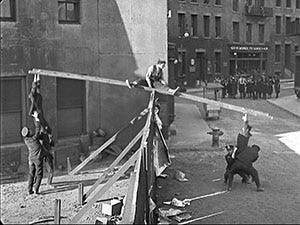

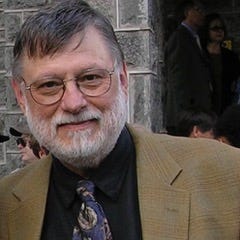
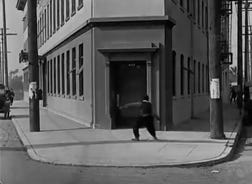
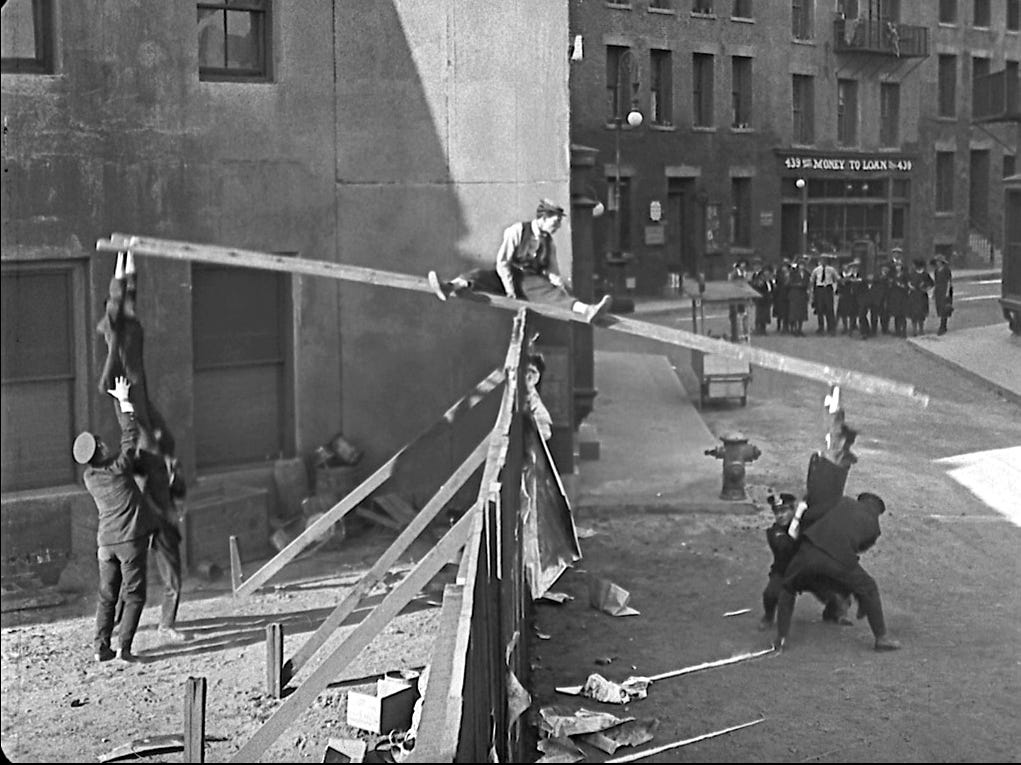


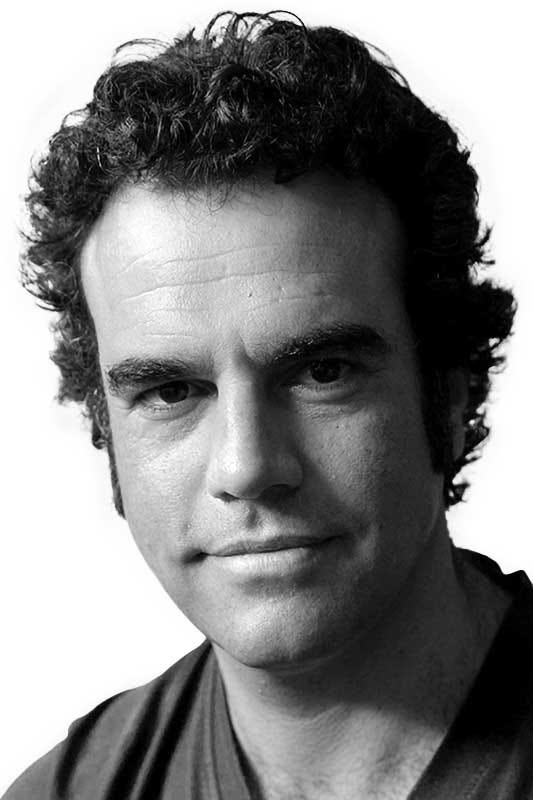



Yes, the comic genius of Wittgenstein has been largely overlooked. Along with Keaton, one could recognize the influence of Wilde (through the Bloomsbury group), whose comedy concerned searching among the most trivial things to find nuggets of truth and beauty. This is a specifically *queer* strategy, perfected by Wittgenstein, and most of us who take pleasure in Wittgenstein do so for his elevation of the apparently trivial. 20th century Anglo philosophy worked hard to dismiss this aspect of W., in part due to homophobia, and to an academic environment that overemphasized the more “serious” aspects of human thinking. (“My propositions serve as elucidations in the following way: anyone who understands me eventually recognizes them as nonsensical, when he has used them—as steps—to climb beyond them.”)